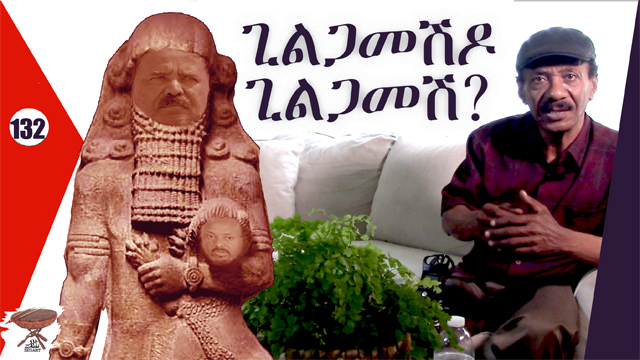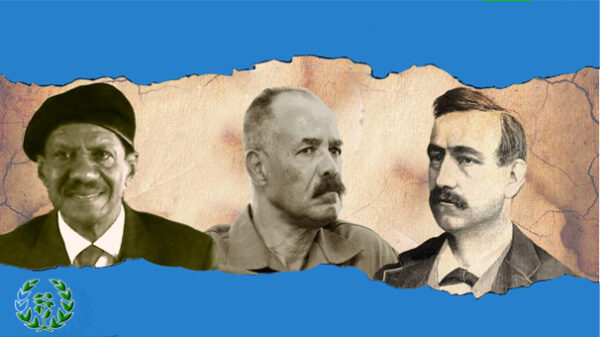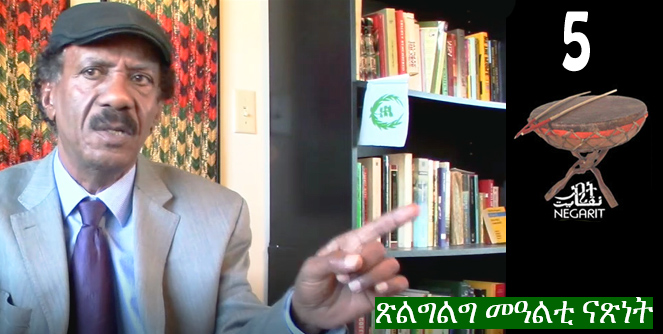Gilgamesh or Gilgamesh?
Hormuz Rassam was well known in Europe after he made important archeological discoveries in Iraq between 1877-1882. He found the Nimrod collection, the Hanging Garden of Babylon, the Palace of Nebuchadnezzar, and the clay tablets in which the Epic of Gilgamesh was curved in cuneiform—the oldest written story. Then he became a diplomat and eventually sent to Abyssinia (modern day Ethiopia) to negotiate with King Tedros to secure the release of the British and other Europeans the king has taken hostages.
In 2,600 BCE King Gilgamesh ruled over Uruk in Mesopotamia, from which the modern name Iraq derives its name from. World libraries and the Internet is awash with many versions of the Epic of Gilgamesh. The main version of the Epic of Gilgamesh survives in a twelve clay tablets from the seventh century BC.
The Epic of Gilgamesh
According to the mythology, Gilgamesh was “two thirds divine and one third mortal.” He is described as a brutal, oppressive ruler who forced brides to his bed before they go to their grooms and imposed a forced labor regiment on his subjects–just like the pharaohs did or like the Sawa forced labor camp in Eritrea. As punishment for Gilgamesh’s cruelty, the god Anu created a wild man Enkidu. The terrifying Enkidu lived in wild like an animal.
Gilgamesh told his mother, Rimat-Ninsun who had some godly powers, of a dream he saw in which a meteorite was sent by Anu and that he tried to lift it up but was too heavy for and he couldn’t. She explained to him that the meteorite is a man, as strong as a meteorite and he will meet Gilgamesh and become his loyal friend. Gilgamesh was happy and expected to meet a new friend.
When a young hunter saw Enkidu, who destroyed his hunting traps, the boy went to his father and told him what has happened. The father told his son, to go to Uruk and tell King Gilgamesh about Enkidu and Gilgamesh will send the temple harlot with him to take her to where Enkidu was. The boy went to Uruk and told the story to Gilgamesh who told Shamet the harlot to accompany him and wait by the watering hole until Enkidu comes there and then Shamet will undress and overcome the strong Enkidu.
Shamhat Lured him from the Wild
The trapper boy and Shamhat travelled for to the place and sat down by the water hole. Then Enkidu, who living on grasses with the animals came to drink water and Shamhat undressed. Enkidu was attracted to her, and he spent seven nights taken hostage by her charms.
Shamhat convinced Enkidu to go to Uruk with her and meet Gilgamesh and see the fine dresses and food of the people and enjoy the feasts and the happy life of the city. She made him look forward to a life better than he was living.
Enkidu arrived in Uruk and met Gilgamesh, but the two men had to wrestle, and although Gilgamesh wins the match in the end, he is so impressed by Enkidu’s strength and tenacity that they become close friends. Now Gilgamesh tells Enkidu about the monstrous Humbaba the monster who lived in the Cedar Forest, and that they must defeat him. The two cross the seven mountains to the Cedar Forest and start chopping down trees. The angry Humbaba shows up roaring and scares Gilgamesh who prays to the goddess Shamash; she sent wind to Humbaba’s eyes and blinds him. Humbaba begs for mercy, but the two kill and cut him into pieces.
When they returned to Uruk victorious, the goddess Ishtar comes to Gilgamesh and asks to become his mistress, but Gilgamesh rejects her because she has mistreated all her former lovers. In revenge, Ishtar goes to her father Anu and demands that he send the Bull of Heaven to attack Gilgamesh.
While Gilgamesh and Enkidu are resting, Ishtar comes with the bull and stands on the walls of Uruk and curses Gilgamesh. The bull rushed to attack the two, but Gilgamesh cuts the Bull’s hear and throws it at Ishtar and tears off the Bull’s thigh and throws it in Shames’ face. While Shamash mourns for the Bull of Heaven; Gilgamesh holds a celebration for defeating the Bull of Heaven.
Enkidu sees a dream in which he saw the gods Anu, and Shamash declare either Gilgamesh or Enkidu must die as punishment for having slain the Bull of Heaven. They choose Enkidu who soon become sick and dies. Gilgamesh is saddened by his friend’s death. Driven by “grief and fear of his own mortality, he travels a great distance and overcomes many obstacles to find the home of Utnapishtim, a survivor of the Great Flood, who was rewarded with immortality by the gods.”
On the way, Gilgamesh is faced by a man with bird wings and a scorpion tail, and by a lion that he slays in the mountain pass on his journey to find Utnapishtim. Gilgamesh wanders through darkness for twelve days before he finally comes into the light. He finds a beautiful garden by the sea in which he meets Siduri, the divine beer-seller. She attempts to persuade him to accept death as inevitable and not journey beyond the waters. When Gilgamesh refuses to do this, she directs him to Urshanabi, the ferryman of the gods, who ferries Gilgamesh across the sea to Utnapishtim’s homeland. Finally, Gilgamesh finds Utnapishtim’s who tells him that, to become immortal, he must defy sleep. Gilgamesh fails to do this and falls asleep for seven days without waking up.
Next, Utnapishtim tells him that, even if he cannot become immortal, he can restore his youth using a plant with the power of rejuvenation. Gilgamesh takes the plant but leaves it on the shore while swimming and a snake steals it, explaining why snakes can shed their skins. Disappointed, Gilgamesh returns to Uruk which he shows to the ferryman Urshanabi…
Gilgamesh’s Relationship to the Bible
Various stories from Hebrew Bible thus with the Christian Bible and Quran correlate with the Epic of Gilgamesh – the Garden of Eden, the expulsion from Paradise and significantly the story the flood as narrated in Noah. When George Smith, a Britisher, deciphered the Epic of Gilgamesh, the world’s oldest story that included the flood myth written 1000 years prior to the earliest record of the Biblical story of Noah—it caused much debate because many considered the story of Noah original. However, in the biblical account of Noah mentions only species known in the Middle East, for instance there is no mention of the Kangaroo. Today it’s believed there are 8.7 million species. Not all could have been in Noah’s Ark.
Garden of Eden
The stories of Enkidu/Shamhat and Adam/Eve have similarities. In both, a man is created from the soil by a god, and lives in a natural setting amongst the animals. He is introduced to a woman who tempts him, he accepts food from the woman, covers his nakedness, and leaves heaven and a snake that steals a plant of immortality. It seems the biblical story is a continuation of Gilgamesh because it appeared first in almost exact sequence.
In Gilgamesh, Ninti, the Sumerian goddess of life, was created from Enkidu’s rib—2500 years before Christ. While Eve was created from Adam’s rib in the Book of Genesis, and in the Geez book of Enoch, and the Book of Giants found at Qumran that mentions Gilgamesh and the monster Humbaba.
Gilgamesh and the Bible
In both stories, a woman is responsible for the transition of a man who had once eaten and drunk with the animals to a state of separation from nature. Once Enkidu is rejected by the animal world, the woman Shamhat gives him clothing and teaches him to drink beer and eat bread thus leaving bis natural state behind.
In Genesis, once Adam has eaten the fruit of the tree of knowledge, he is ashamed and covers his nudity and is sentenced to a life of cultivating food by harsh labor.
In Gilgamesh, when Enkidu becomes estranged from the animals, Shamhat tells him that he has become “like a god.” Later, on his deathbed, Enkidu laments his removal from a state of nature, only to be reminded by the goddess Shamash that while civilized life is full of difficulties and mortality, it is a worthwhile price for cultural knowledge and awareness.
NB:
1. this content is a rough copy from Negarit 132 (YouTube Channel).
2. Most of the content is not original and is taken from the Internet and from several books.





Awate Forum